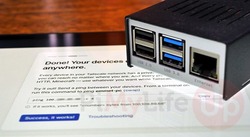Devices/Hardware: Raspberry Pi, Arduino, and More
-
Installing Tailscale to the Raspberry Pi - Pi My Life Up
Tailscale is software that allows you to set up a zero-configuration VPN on your Raspberry Pi in minutes.
Designed to remove the complexity of setting up your own VPN, Tailscale doesn’t even require you to open any ports in your firewall for it to operate.
Being built on top of Wireguard also has its benefits. Tailscale gives you a fast, secure, and private connection to your device.
-
Keropunk Part 1: Lanterns
This may seem a slightly odd series of posts for me. I normally talk about solar, electronics, and associated technologies. Why delve back into the archaic technologies of inefficient combustion light and heat?
Because the electrical grid is a mess, is getting worse, and if you’re not in agreement, the grid just keeps finding ways to prove the point - and “after things have gone black for a while” is not the time to be trying to obtain tools to help you out.
-
DIY out-of-band management: remote power button
I was pleasantly surprised by how easy it was to make it possible to push a PC’s power button remotely via MQTT by wiring up an ESP32 microcontroller, a MOSFET, a resistor, and a few jumper wires.
While a commercial solution like IPMI offers many more features like remote serial, or remote image mounting, this DIY solution feels really magical, and has great price performance if all you need is power management.
-
Acorn Archimedes A3010: Restoration Part 3
I’ve been testing various things with the Archimedes A3010 (which I have been calling “Archie”) and noticed a problem. When it is switched off for over half an hour the CMOS settings get lost. But I have an RTC battery in, what gives?
-
Simple CNC Gear Production With Arduino
We’ve seen plenty of people 3D printing custom gears over the years, but [Mr Innovative] decided against an additive process for his bespoke component. He ended up using a simple CNC machine that makes use of several components that were either salvaged from a 3D printer or produced on one. Using a small saw blade, the machine cuts gear teeth into some plastic material and — presumably — could cut gears into anything the saw blade was able to slice into, especially if you added a little lubrication, cooling, and dust removal.
-
Can Arduino be Repaired
Arduino boards are widely used around the globe for educational purposes. Arduino targets many students, engineers, and teachers. Working with Arduino is super easy when it comes to user friendly IDE and highly compatible boards. But the real trouble for users begins when a single wrong wiring connection leads to shutting down the Arduino board. Once the damage is done to the Arduino, the first question which comes to mind is can the Arduino be repaired. This guide will be the answer to this question.
-
Film camera tester helps you tune your rig | Arduino Blog
By their very nature, digital cameras are always measuring the amount of light hitting their sensors and use that information to adjust exposure times. But film cameras require adjustment to get the proper exposure for a particular setup and even swapping lenses can change that. Traditional calibration equipment is expensive, but this DIY film camera tester kit is an affordable alternative.
To perform the tests needed to calibrate a film camera, you want a precision light source and an accurate exposure sensor. An exposure sensor alone does work for some tests and the kit has provisions for those, but a calibrated light source helps to configure light meters built into cameras. This kit provides both light source and exposure sensor options, with different modules available for common camera types. The full kit allows for both time-based and light-accumulation calibration tests for film cameras.
-
Asus mini PC features Ryzen 6000H series processors
Asus recently announced the ExpertCenter PN53 mini PC which features AMD Ryzen processors from the 6000H series. Some notable features of this mini PC include quad 4K displays, Wi-Fi6E/BL5.2, one 2.5GbE LAN ports and up to 32GB DDR5.�
-
This ESP32 CAN!
Since modern cars use the CAN bus for so many of their functions, it’s unsurprising that it’s a frequent object of interest for those in our community. Some people go no further than commercial plug-in analysers, while others build their own CAN devices. This is what [Magnus Thomé] has done, with his RejsaCAN microcontroller board.

